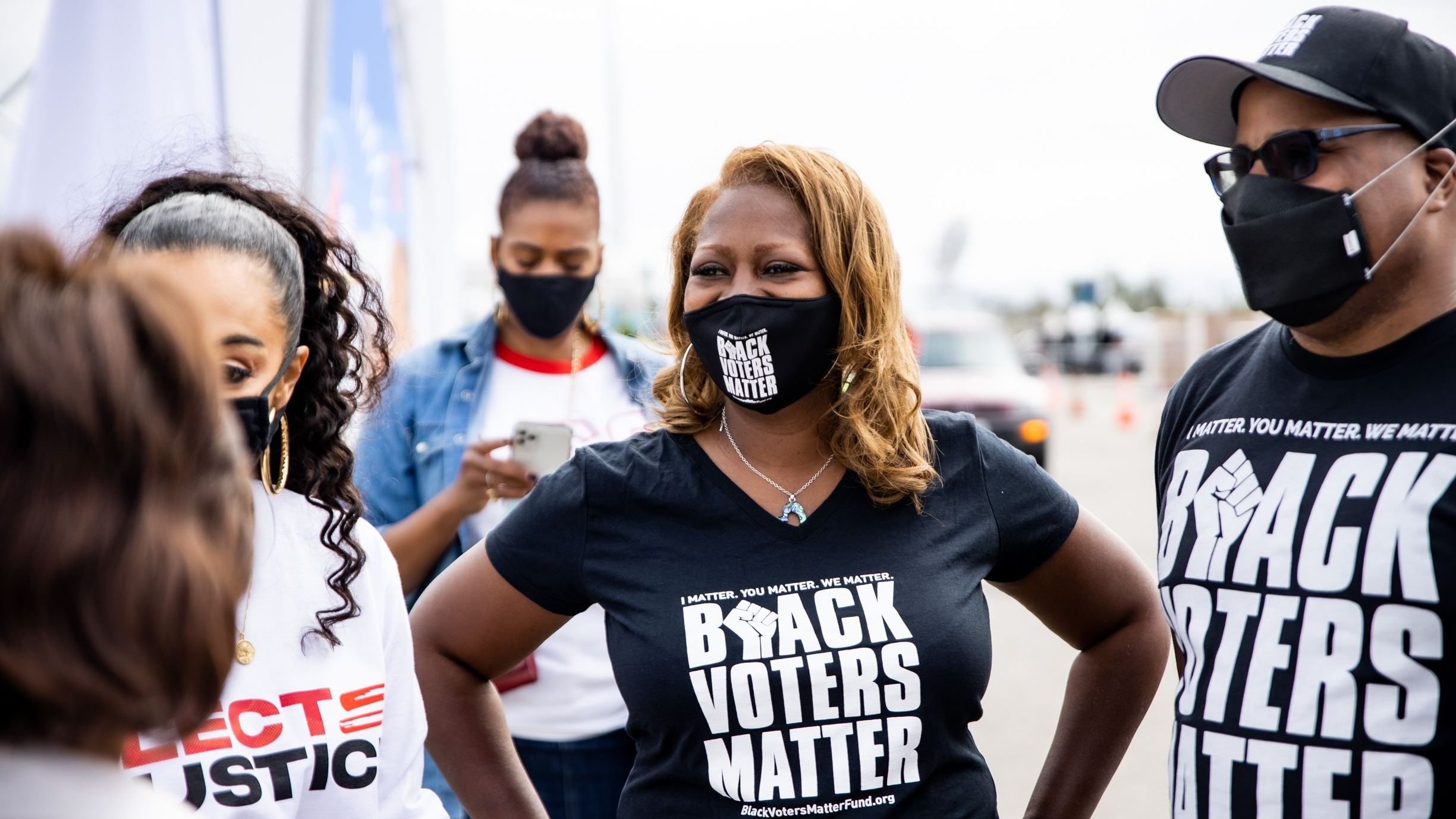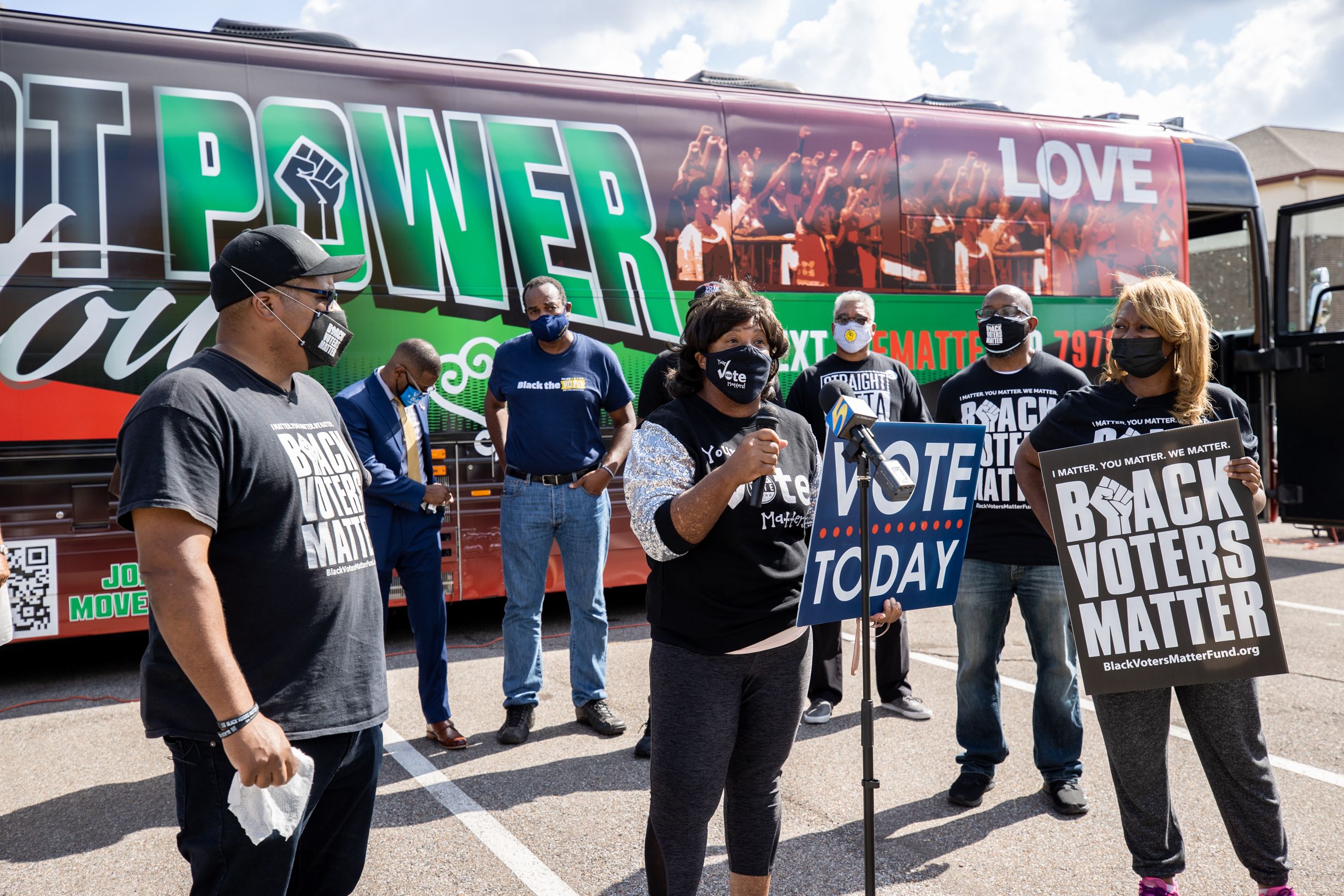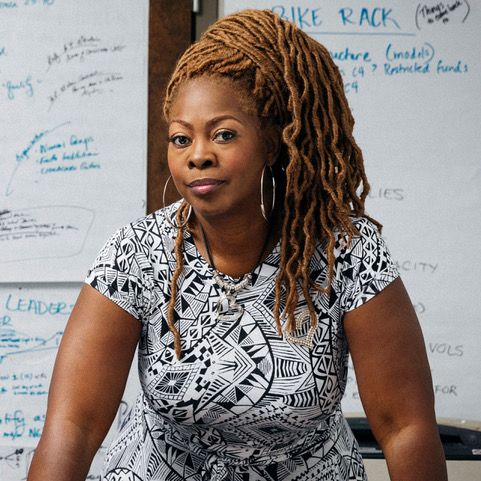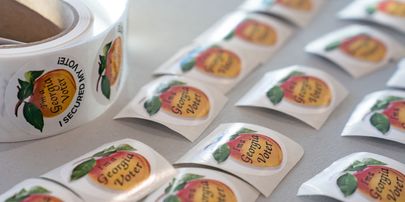LaTosha Brown Says a New South Is Rising
Georgia flipped blue thanks to the organizing led by Black women like Brown, cofounder of Black Voters Matter. Now, the work continues.


LaTosha Brown doesn't like to use the terms "blue state" and "red state." It's true, Georgia voted in Joe Biden's favor during the 2020 presidential election and technically became a "blue state." But Brown thinks the red state/blue state framework limits us. "It makes you choose a side. Ultimately, what we're trying to say is that Georgia is a new South state. There's a new South rising. It's younger, it's more diverse, it's more progressive, and it's more inclusive."
Brown is one of the dedicated organizers who have been laying the groundwork for this new South. In 2016, she founded Black Voters Matter and the Black Voters Matter Fund with fellow activist Cliff Albright. Their aim: to increase the influence, power, and representation of Black people through effective policy, and to invest in grassroots Black-led groups. As the 2020 election results trickled in last week, Brown found herself in the spotlight, praised for her leadership alongside Fair Fight founder Stacey Abrams and The New Georgia Project CEO Nse Ufot. Their commitment to making sure the Black community is heard helped increase Black voter turnout and, ultimately, flip Georgia blue for the first time in 28 years.
"We were frustrated with how the South had been talked about and not considered within the national political landscape. The majority of Black people live in the South. So, if you dismiss the South, you're dismissing Black people," Brown tells Marie Claire. "We felt like we needed to have a counter narrative that said that you can build a progressive, multi-racial, multi-generational movement in the South and be able to break up this conservative Republican stronghold in the area."
Black Voters Matter played a key role in helping then-Democratic nominee Doug Jones defeat Roy Moore in 2017, the first Democrat since 1992 to win a U.S. Senate seat in Alabama. Although Jones lost this year, Brown acknowledges the progress that's been made and will continue to be made in that deep red state. That is, when you focus on long-term power building. Georgia is proof of that.
Ahead, Brown discusses how Black Voters Matter's organizing will evolve after the 2020 election, common misconceptions about Black voters, and how the Biden/Harris administration will have to be held accountable over the next four years.
Marie Claire: To what do you credit the increase in Black voter turnout this election cycle?
LaTosha Brown: People are frustrated and tired of the way that the Republicans have tried to suppress our voices and our votes. Our response is that we are building these new coalitions. The conversation for us around voting was not just rooted in participation, but about building power. There are several movements: You had the Poor People's Campaign. You've got our organization. There were other social justice movements that were saying that we've got the power to change the South, that we've got the power to shift the policies going forward. My organization took that and ran with it, as others did.
Get exclusive access to fashion and beauty trends, hot-off-the-press celebrity news, and more.
This Black wave of voters was rooted in the uprisings that happened; this liberation summer after [the murders of] George Floyd and Breonna Taylor. You saw a response to the current administration. You saw a response to our frustration around COVID-19. It was important that there was a Black woman on the ticket because I know women activists, like me, were adamant to see a Black woman put in the White House. There were also folks that were just straight up like, Trump got to go.
MC: What has Black Voters Matter's organizing looked like in the past, and what will it look like moving forward?
LB: What we were able to do the past few years was focus on building capacity and building relationships. Although Cliff and I are long-term organizers in the region and we have a set of relationships, we're a fairly new organization. So, the first four years was about getting rooted, testing the model, working with organizations, building the relationships, and building the base. In this election cycle, we funded more than 600 Black-led grassroots groups in 12 states. We had a bus tour that went to 15 states. We made contact with at least 10 million Black voters in that process.

Brown, far right, during Black Voters Matter’s national outreach tour across more than a dozen southern and midwestern states. The tour began on September 26 and continued through Election Day.
The second phase of the work will continue to be base building, but we're also adding more work around governance. You're going to see us in more policy discussions. Because of the census, we know the redistricting is happening next year. That is going to be a big focus point for us. We're also going to focus on: how do we actually push this administration to have a robust agenda that does not leave the African-American community out?
The third thing we're going to do is continue to build our leadership pipeline. The good thing about doing work on the ground, doing deep grassroots work, is that you always uncover diamonds. During this process, we were able to connect with some amazing young women and leaders in our community that we want to support. We've added a legal advocacy component as well. So, we're going to expand some of the work that we do around both policy and on the legal front.
MC: I know you don't like using the term "blue state," but do you have hope that states like Florida and Alabama can flip blue one day too?
LB: Absolutely. Our work there has been successful because we don't think that power only happens in the presidential election. We actually think that the most critical part of an election is the local election. We have scores of victories in Florida and Tennessee and Alabama on the local level, where we think change is from the ground up. Some cities that have never had African-American mayors, or majority on the city council, now have representation. You've got places like Nashville that has a community police oversight board. It's hard to get people excited about a presidential election every four years when they're losing power in their local races. There's never an off season for us.
You're going to start seeing some changes in the South on the national level, but on the local level you're going to start seeing communities take more power and use more of their power. Beto [O'Rourke] didn't win [in 2018], but Beto almost won and once upon a time that would have been impossible. Michael Espy didn't win [in 2018 and 2020], but Michael Espy came really close. My point is, something is changing. What we see is that the politics in the South are starting to be more reflective of the people who live in the South.
MC: I want to talk about Black youth voter turnout. Did Black Voters Matter have a separate effort to specifically target Black youth voters? If so, what were some of those tactics?
LB: One, we worked with youth organizations and supported youth organizations that were leading the work. We also had young women leading work, particularly with HBCUs. A lot of the work that was led on the ground, quite frankly, was led by young women. And it wasn't just college youth. It was communities. When I think about the energy of who was leading the work in both Michigan and Pennsylvania, they were young people. I do believe a lot of that came out of the Black Lives Matter movement. Black Lives Matter has ignited this generation of millennials, and we were able to work with many of them [like Movement for Black Lives and Woke Vote], but also being able to integrate young leadership within our own ranks to allow them to lead in a way that they felt would resonate with their peers. We didn't have a youth program, we just had young folks doing their thing.

LaTosha Brown, cofounder of Black Voters Matter.
MC: What are some common misconceptions about Black voters?
LB: We have to show the narrative that Black women led the way, but Black men stood with us too. I'm saying that because Black men voted at a higher rate against Trump than any other constituency group in this country, with the exception of Black women. What sexism did to women is made us invisible. We want to make sure that the voices of women are elevated and that our contributions are acknowledged, but we don't want to do that the same way the men did—at the expense of invisibilizing the men. As hard as I work—and I certainly believe as a Black woman I had a particular edge and advantage in this moment—my counterpart Cliff Albright worked just as hard, if not harder. One of the biggest misconceptions is that, because this was women-led, that men didn't participate. No. We were the main drivers, but it was not exclusive to us.
The second misconception is that Black voters need to have a charismatic candidate. After Obama, there was a lot of discussion around how Black folks came out that year because we had this candidate who was charismatic and he was a Black man. The truth of the matter is more [Black people] voted for Biden. What that [says] to me is that what we were really voting for was ourselves. We vote for what is practical for our needs, and it's not necessarily always centered around the party or the candidate. So, there's this misconception that Black folks were excited about the Democratic Party; I still have a critique of how the Democratic Party has to be more inclusive of Black people in the agenda that lifts up Black folks.
MC: Rep. Alexandria Ocasio-Cortez said in a recent New York Times article that we need to do a lot of antiracist work in this country, and if we keep losing white voters "there’s no amount of people of color and young people that you can turn out to offset that." Do you hold similar views?
LB: I agree with that. Until we deal with structural racism, this country will never fulfill her highest purpose. The fact that over 70 million people voted for a man who did not care about the health and wellbeing...hell, he didn't care about the health and wellbeing of himself. The one thing he was consistent around was racial rhetoric. It's not that the country is deeply divided; the country has never dealt with this underlining cancer of sexism and racism. What Trump did is exposed it and brought it to the surface. If there's any time for us to really commit to doing something around forging a new future and radically reimagining this nation, I think we got a good start. This is the moment to do that.
MC: On a joyful note, what does it mean to you to have Kamala Harris, a Black and South Asian woman, become Vice President-Elect of the United States?
LB: I am so proud of that sister. I am proud of Black women. I am proud of women. I'm proud of folks who took the chance and voted for her. At this moment, this is all of our moment. As she said in her speech, she is the first, but won't be the last. The greatest hope that this nation has is that we'll find more women in leadership. Women are going to be the foundation of this democracy long-term. I really believe that.
MC: What are you hoping the Biden/Harris administration will prioritize?
LB: The first thing is I want them to actually not be afraid, to be bold, and to support the people that supported them—the working class, everyday Americans, and poor folks supported them. You hear folks talk about the middle class and there's no conversation around poor. There are 38 million poor people in this country. How do we lift people out of poverty in this country?
I want to see them pass, in the first 100 days, the BREATHE Act, which was legislation led by the Movement for Black Lives and others, where there's greater police accountability. I want to see the Red, Black, & Green Agenda, which really centers on climate change, but not at the expense of inequities that we normally see in our communities.
"I'm a cultural worker as well, so we use a lot of art in this process. We also have to generate Black joy."
I also want to see the most sweeping economic and health package that we have ever seen to change the outcome for women in this country. Sixty-eight percent of Black women are wage workers, and there's this wage gap between women and our male counterparts.
One of the projects that I founded is the Southern Black Girls and Women's Consortium, which is a $100 million dollar initiative for investment in the South. I want to see an investment package for Black girls and girls of color in this country. Oftentimes, the gap between men and women is sparse while they're children. So, at the end of the day, I want to see a sweeping education reform package.
And, most importantly, health care, health care, health care. I don't know how to stress that anymore. I want to see a health package that deals with the health and inequities that the Black community has been facing. We see that with COVID-19. If we want to be healthy as a nation, we need to make sure that we have some provision for all of us to have access to health care.
This interview has been edited and condensed for clarity.
Related Story

Rachel Epstein is a writer, editor, and content strategist based in New York City. Most recently, she was the Managing Editor at Coveteur, where she oversaw the site’s day-to-day editorial operations. Previously, she was an editor at Marie Claire, where she wrote and edited culture, politics, and lifestyle stories ranging from op-eds to profiles to ambitious packages. She also launched and managed the site’s virtual book club, #ReadWithMC. Offline, she’s likely watching a Heat game or finding a new coffee shop.
